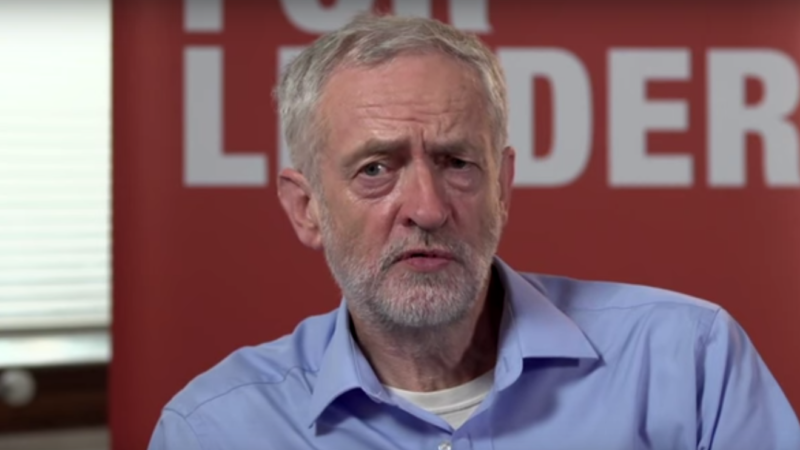
‘We challenge the narrative that only the individual matters, the collective is irrelevant. And instead we say the common good is the aspiration of all of us.’ And there, in two confident sentences which define what Labour has always stood for, we have the reason Jeremy Corbyn will be leader of the Labour Party by Saturday lunchtime.
Since the trauma of division and defeat in the early 1980s, Labour has been beset with insane anxiety about its relationship with the British people.
Our self-proclaimed moderates vex about ‘power’ and the need to win the support of enough British voters to win it. The result was supposed to be victory after victory. The reality was a paralysing emptiness. Politicians got stuck imagining what voters would think about what they were saying instead of thinking about what they wanted to say. Political language ended up ‘defensive, stilted and circuitous’, as political scientist Alan Finlayson put it.
Most importantly, anxiety about their relationship with the public led politicians to obsess about themselves. They focused on the medium more than the message. From Kinnock’s cliffside walk to leadership candidates being filmed writing letters to supporters, it was the politician, not the story about the people and country they are trying to represent, who seemed to be at the centre.
Corbyn’s most radical challenge is to the political obsession with the individual ego of the politician.
It is a challenge particularly against what I’d call late Blairism. Blair’s success in 1997 was built on an appeal to the common good. But by the early 2000s, Blair’s vision had shrunk to the ‘delivery’ of good public services, with individual politicians having power and the public acting as good, dutiful consumers.
Put simply, politicians win when they convincingly talk about what we can do together – not just what I can do for you. The obsession with the ego of the politician forgets that politics, particularly the politics of the left, can only succeed when it appeals to the collective.
With packed, old-style public meetings, decent (not spectacular) speeches and supporters with real passion, Corbyn’s campaign has re-injected the spirit of collective action back into Labour politics.
The tragedy is that his idea of the common good is at odds with so much of the rest of the British society. I didn’t support Corbyn because believe his politics are built on a flight from the reality of modern Britain.
Corbyn’s politics rely on an idea of the common good, yes. But it is an idea which seems to polarise a small band of good socialists against the rest of us. Too often it seems that Corbyn projects an idea of a virtuous radical elite against the majority of British society.
Corbyn’s opponents lost because they seemed to put pragmatism before Labour values. The argument of Labour’s centre and right seemed to be that Labour can only win by conceding to the selfish, conservative values of British society.
My point is different. I don’t think Britain is selfish or big-C conservative. I don’t believe we need to sell out our principles for the sake of pragmatism. I think we should, instead, recognise where Labour values of solidarity and collective action already exist in present-day society. We are a far more collectivist society than Labour politicians from left and right imagine.
Too often, Corbyn and his supporters think the bureaucratic state is the only kind of collective action that works. But hostility towards state power isn’t driven by individualism. Governments can be divisive and alienating, encouraging selfishness rather than solidarity. Well-run private businesses can be inclusive forces of economic growth and social equality.
Even some of the ideas the left attacks most harshly are driven by a concern with the common good. Take austerity. For the rich, it is an excuse to increase profits and squeeze the low paid. But for many ordinary Britons, belief in the need to balance the national accounts is about securing the long-term future of our society as a whole.
Convinced of the fundamental evils of capitalism, the far-left does not sufficiently recognise the possibility of altruism in present-day society. I worry that Corbyn and his supporters are too passionately wedded to a series of abstract propositions that don’t connect to reality.
Most of Corbyn’s arguments are stuck in the early 1980s, in battles against monetarism, militarism and old-school privatisation which have long become irrelevant.
Yet, he deserves to win. Of the four candidates, only Corbyn made a serious case for a politics rooted in a sense of collective action. Corbyn is the only candidate who has consistently talked about what we can all do together, not just how we can gain as individuals.
The task for the rest of us is to build a politics of the common good which includes the majority of British society.
Jon Wilson is a historian at King’s College London




More from LabourList
Government abandons plans to delay 30 local elections in England
‘The cost of living crisis is still Britain’s defining political challenge’
‘Nurses are finally getting the recognition they deserve’